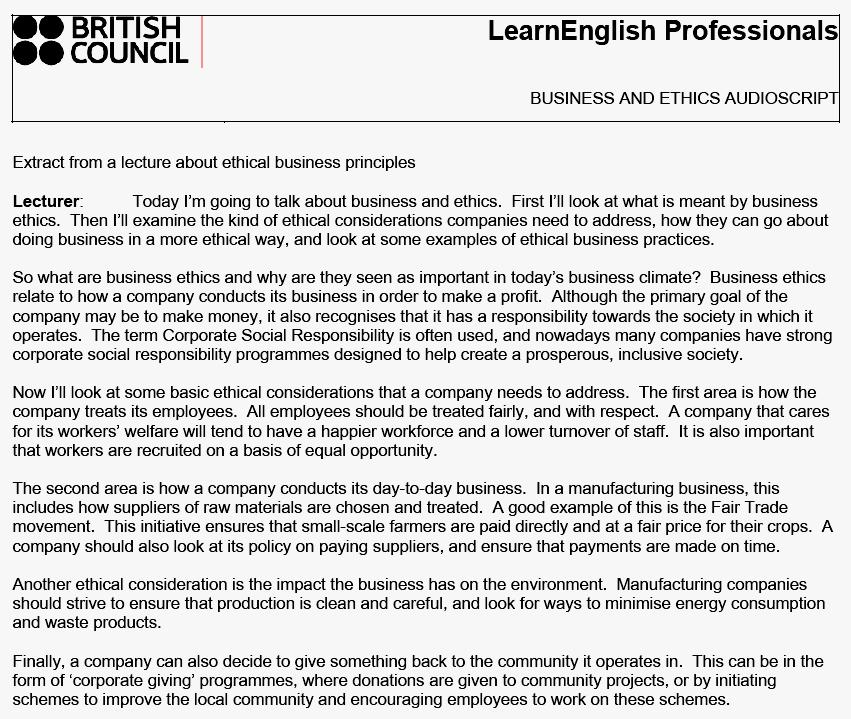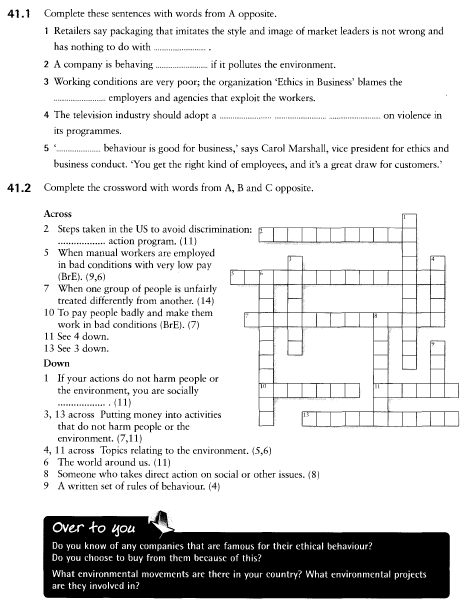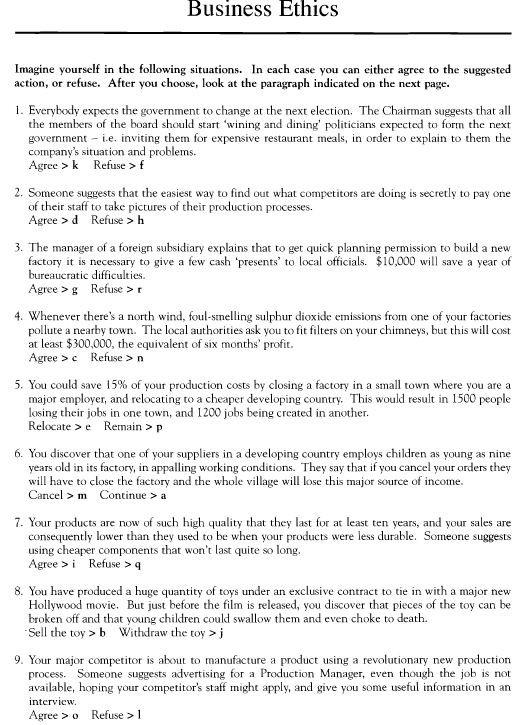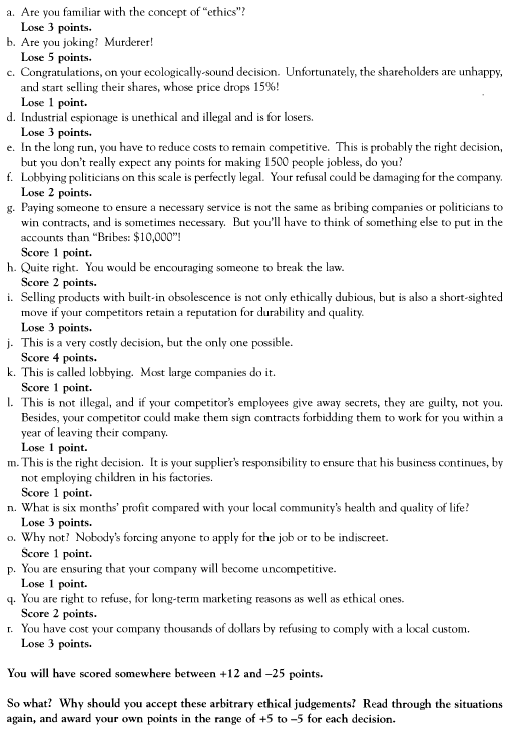
- •Read the text and complete the gaps with prepositions where necessary Respect, Responsibility, Results by George s. May
- •Read the text and complete the gaps with the words given below
- •Guidelines For Ethical Business Operations
- •By George s. May
- •Case study: ethical business James Carston, Fine Shirtmakers

Listen to an extract from a lecture about ethical business principles and complete the gaps
Lecturer: Today I’m going to talk about __________. First I’ll look at what is meant by business ethics. Then I’ll examine the kind of ethical considerations companies need to address, how they can go about __________in a more ethical way, and look at some examples of ethical business __________.
So what are business ethics and why are they seen as important in today’s __________? Business ethics relate to how a company conducts its business in order __________. Although the primary goal of the company may be __________, it also recognises that it has a __________towards the society in which it operates. The term __________is often used, and nowadays many companies have strong corporate social responsibility programmes designed to help create a __________, inclusive society.
Now I’ll look at some basic __________that a company needs to address. The first area is how the company treats its __________. All employees should be treated __________, and __________. A company that cares for its workers’ welfare will tend to have a happier workforce and a lower turnover of __________. It is also important that workers are recruited on a basis of __________.
The second area is how a company conducts its __________. In a manufacturing business, this includes how suppliers of raw materials are chosen and treated. A good example of this is the Fair Trade movement. This initiative ensures that small-scale farmers are paid __________and at a fair __________for their crops. A company should also look at its __________on paying suppliers, and ensure that payments are made __________.
Another ethical consideration is the impact the business has on the __________. Manufacturing companies should strive to ensure that production is __________and careful, and look for ways to __________energy consumption and waste products.
Finally, a company can also decide to give something back to the __________it operates in. This can be in the form of ‘corporate giving’ __________, where donations are given to community __________, or by initiating schemes to improve the local community and encouraging employees to work on these schemes.


Read the text and complete the gaps with prepositions where necessary Respect, Responsibility, Results by George s. May
Who's responsible ______ (1) acting ethically? You are! It isn't the "company." It isn't just the business owner. It isn't only your manager. It is every person. Ultimately, each ______ (2) us is responsible ______ (3) our own actions, including being ethical. Considering the "3R's" will point ______ (4) you and your employees ______ (5) the right ethical direction.
The first "R" of business ethics is RESPECT. It is an attitude that must be applied ______ (6) people, organizational resources and your environment. Respect includes behaviour such as:
Treating everyone (customers, co-workers, vendors, etc.) ______ (7) dignity and courtesy.
Using company supplies, equipment, time, and money appropriately, efficiently, and ______ (8) business use only.
Protecting and improving your work environment, and abiding by laws, rules and regulations that exist to protect our world and our way of life.
The second "R" of business ethics is RESPONSIBILITY. You have a responsibility ______ (9) your customers, your co-workers, your organization and yourself. Included are behaviours such as:
Providing timely, high-quality goods and services.
Working collaboratively and carrying your share of the load.
Meeting all performance expectations and adding value.
The third "R" of business ethics is RESULTS. Essential ______ (10) attaining results is an understanding that ______ (11) the way results are attained - the "means" - are as important if not more important than the ultimate goals - the "ends." Using the phrase "The ends justify ______ (12) the means" is an excuse that is too often used to explain an emotional response, or action that was not well planned or carefully considered.
Obviously, you are expected to get results ______ (13) your organization and ______ (14) your customers. However, you are also expected to get those results legally and morally, by being ethical. If you lose sight ______ (15) the distinction, you jeopardize your job, your business and your career.
By considering Respect, Responsibility and Results before taking action you will avoid the following common rationalizations ______ (16) not doing what's right:
"Everyone else does it."
"They'll never miss it."
"Nobody will care."
"The boss does it."
"No one will know."
"I don't have time to do it right."
"That's close enough."
"Some rules were meant to be broken."
"It's not my job."
Read the text and complete the gaps with the words given below
agreement appropriate awareness legal policies practice relationship role model sense specific theoretical unethical violations
Guidelines For Ethical Business Operations
By George s. May
Knowing what's ethical helps you and your employees make ________ (1) decisions. Too many ethics discussions are ________ (2). Here are six very practical steps for ethical decision making.
It seems every day there are new stories about businesses and organizations being accused of or investigated for ethical ________ (3). These events around the world have heightened everyone's ________ (4) of ethical business practices.
Investigations of many high-profile companies accused of ________ (5) conduct show that most had elaborate ethics policies or guidelines. It was the people at the companies, however, who did not pay attention to the ________ (6).
A key point to remember about business ethics is that in spite of the codes of ethics, ethics programs and special departments, corporations do not make ethical decisions. Individuals make the ethical choices. A business should provide the environment or atmosphere for acting ethically, but it is the people of the business that put ethics into ________ (7).
To help you determine if your actions are ethical, compare them to these six basic guidelines for ethical business operations.
Laws
Rules & Procedures
Values
Conscience
Promises
Heroes
LAWS - Laws are created to help society function. Is the action you are considering ________(8)? Do you know the laws governing the activity? In general, ignorance of a law is no excuse for breaking the law.
RULES & PROCEDURES - Companies create ________ (9) policies and procedures to help the business function appropriately. Typically, these rules have developed as ways to keep the company successful and avoid problems. How does your planned action compare to what is stated in the company's policies and procedures?
VALUES - These social principles help to create society's laws and a company's policies and procedures. In turn, laws and policies reinforce the values. One example of values in operation is to ask yourself: "Does the action I'm considering follow not only the letter of the law, but also the 'spirit' of the law?" Is your action in ________ (10) with the overall purpose of a law or rule? Or are you attempting to find a loophole?
CONSCIENCE - This internal ________ (11) of right and wrong develops from an early age. Your conscience recognizes certain principles that lead to feelings of guilt if you violate the principles. Will your actions make you feel guilty? Can you truly justify your actions?
PROMISES - Business is based upon trust. It is the belief that what is stated will be delivered. Will your action live up to the commitment that you made to the other person (customer, client, supplier, employee, employer) in the business ________ (12)? Will your action build more trust?
HEROES - Every person has at least one individual who is a ________ (13) in some way. A hero may be a parent, teacher, coach, mentor or friend. Is your action what your hero would do in the same situation? How would your hero act?
Using these six guidelines will help you take action that is ethical.


